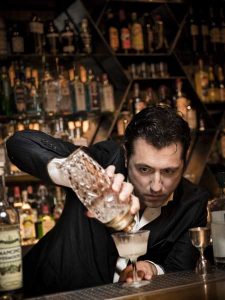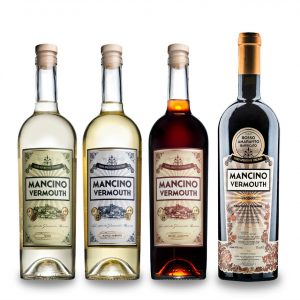Recently creator of Mancino Vermouth, Giancarlo Mancino, was in the country holding tastings and talks, we went along to a packed session in London.
Bartenders creating booze is becoming more prevalent which is no surprise, who knows better what will work in cocktails than those who have been making them for years. One of these people is a guy by the name of Giancarlo Mancino.

Some of our more seasoned readers may well remember him from his time in London where he worked with, amongst others. a certain Salvatore Calabrese. He left 10 years ago and moved to Asia to continue honing his skills. It was there he started to come up with plans to launch his own range of vermouths.
In this day and age having a great product is not always enough, you need a great story and a great front man to really get a new launch off the ground. Within minutes of his presentation it was obvious Giancarlo had the third element nailed.
He kept the crowd entertained as he regaled us with stories of his journey launching the products in 2011 from his production base in North West Italy. His mission was to create a range of vermouths designed specifically for bartenders, with the right levels of flavour for use in classic cocktails as well as interesting nuances to inspire new creations.
The Range
So he had the story and character right, it was time to try the products and check he hadn’t messed up that element.
Secco (18% abv) – Designed to be perfect for your dry Gin Martini the Secco is flavoured with 19 botanicals and a natural spirit Trebbiano di Romagna wine base. The botanicals include sage, marjoram and oregano along with lemon grass, iris and dog rose (I don’t think we got to the bottom of what that is in the UK).
The main point which Giancarlo wanted to promote however is the exceptionally low sugar content for a vermouth, coming in at 1.87g per 75cl bottle. Not only does this help with the balance of the flavour but also aids with its mouth feel and shelf life.
Bianco Ambrato (16% abv) – As well as working in a classic Vesper it also be enjoyed straight up with an orange wedge or a couple of dashes added to a Gin & Tonic. Upping the botanicals to 37 it uses the same Trebbiano di Romagna wine base. This time the botanicals include angelica, mint, elderflower, chamomile, sweet orange, galangal and pink grapefruit peel.
Here the interest lies not in the sugar content but in the Quinine content which comes in at a hefty 8.6%. A figure that was devised after some research on a very old bottle of vermouth Giancarlo purchased.
Rosso Amaranto (16% abv) – Giancarlo wouldn’t be a bartender at heart if he hadn’t worked the Rosso around the perfect Negroni and we’d love to try it in a Manhattan. This time it contains 38 botanicals including vanilla, rhubarb, myrrh, juniper and christmas spices such as cloves, cinnamon bark and dried orange in the same wine base.
The interesting twist with the Rosso comes with the botanicals, as 10 of them are also used in Amaro’s.
Vecchio (16% abv) – The most interesting product in the range started it’s life as Rosso Amaranto before being aged in new Italian Oak Barrels for one year. This makes it the first barrel aged sweet vermouth and currently the only on the market (although if any other vermouth manufactures have tried it I wouldn’t be at all surprised to see many more follow).
Of course vermouth in barrels isn’t a new concept in fact it’s very old as that’s how it used to be transported, however this is the first time it’s been done to intentionally impart flavour. Giancarlo suggests you treat it as you would an old gentleman, personally we don’t put old gentlemen in a glass with a block of ice but each to their own!
What we can tell you is that everyone at the tasting we spoke to were planning on heading out to buy a bottle before they went back to work. The run is limited and whilst Giancarlo plans on making more in future years, by his own admission each year will alter in flavour profile.
The Process
The process of making the vermouths is as important to Giancarlo as the botanicals. It all starts with a mill dating back to 1930 which instead of grinding the botanicals to a powder produces a more ‘cracked black pepper’ sized product. It is this which Giancarlo believes helps extract maximum flavour during the 30 day steeping process.
After the sugar beet alcohol (30% abv) and the wine are added the liquid goes through a mixing machine followed by cooling process, and a one week filtration. The next stage sees the product sit in Inox tanks (traditionally used for wine storage) for 6 months before the bottling and labelling process.
There is no doubt that those in attendance were mightily impressed with the Mancino Vermouth range and the passion and knowledge that the man himself brings certainly comes across in the flavour of the liquid he’s produced.
If you want to get hold of a bottle yourself then the folk at Love Drinks are importing the full range for your enjoyment so get hold of them via their website or on 0207 501 9630

